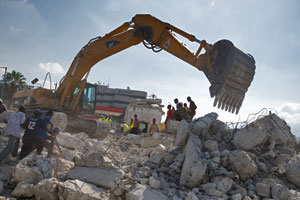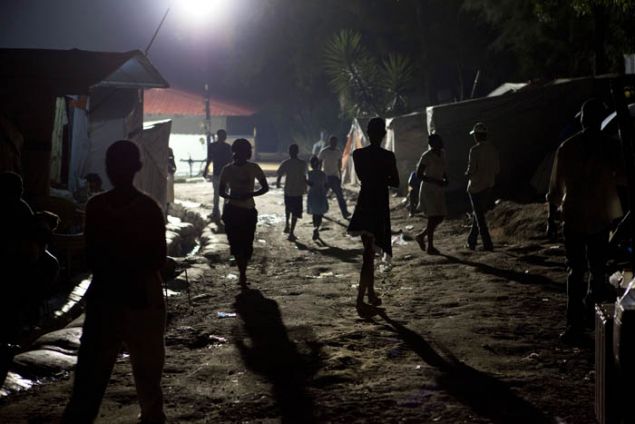For a guy who feels he needs to be armed at absolutely all times, Mike says he’s feeling “perfect” surprisingly often. Like this morning, when he picks me up in a cushy silver truck from my Port-au-Prince hotel, early on a muggy Saturday: “How are you doing?” “Perfect.” And there are two extra ammunition clips on the cup holder between us and a loaded .45 in the driver’s-side door. “You never know,” he says, smiling, when I express skepticism that all this is really necessary; we are just going to the beach. “I wished I’d had extra ammunition when we were firing and firing a few weeks ago.” The half-Haitian, half-Puerto Rican, American-born 34-year-old stops smiling and shakes his head slightly when he says, “You don’t know what it takes to do what I do.”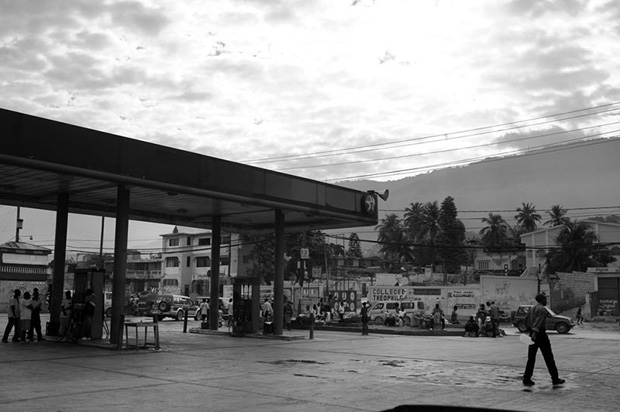 Mike’s Texaco station in Martissant. Photos by Mark Murrman
Mike’s Texaco station in Martissant. Photos by Mark Murrman
What Mike does is run a Texaco station in the Haitian slum of Martissant. According to Doctors Without Borders, the No. 1 cause of death in this neighborhood is violence. According to the eye-widening I see from aid workers and foreign journalists and even other Haitians when Mike tells them where he does business, it is not the type of place a lot of outsiders go. As we drive into one of the roughest neighborhoods in the poorest country in the Western hemisphere, the crush of humanity gets heavier, the piles of garbage higher, taller than a man. Then there’s Mike’s gas station, a big smooth patch of cement with generously spaced pumps and a big building, right in the middle of it. Inside, there’s air conditioning, wide aisles of sundries and snacks, a woman relentlessly mopping the black shoe prints people keep tracking onto the white tiles.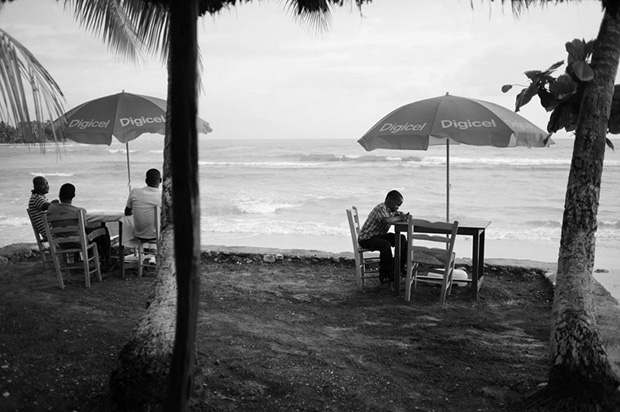 A boy reads a book at one of the tables at La Reference, a restaurant and bar in Jacmel.
A boy reads a book at one of the tables at La Reference, a restaurant and bar in Jacmel.
Outside, naked children pick their way around flaming piles of trash. Inside, like a nice truck stop in Ohio. In the perimeter between them, a couple of guards with 12-gauge shotguns.
Martissant wasn’t always a ghetto. When Mike’s mom grew up here, it was home to clubs that people weren’t afraid to visit. But by the time Mike joined her family here in 1996, the area had started to unravel. Rene Preval was president then, like he is now, but Mike rarely comments on political figures’ roles in Haiti’s well-being. “First thing when I got here, everybody told me that if you want to live in Haiti, stay out of politics,” he says. (Ditto the news; no last names allowed for this story.) But politics do tend to get involved with him.
A few weeks ago, Mike had to step up his daytime security to six guys from the usual four. In December, when Haiti’s electoral authorities announced that the seemingly unpopular candidate backed by the unpopular Preval would advance to the runoff in the presidential election, the streets erupted in protests. In the chaos, his station was a prime target for local gangs. There are a lot of goods in here, and there’s money in the register: Mike sells five or six thousand gallons of gas a day, at $5 a gallon. Cash only. He and his fortified security crew were barricaded inside the station for five hours, behind four-by-eight boards over the windows. It’s a regular enough threat that there are metal tracks bolted into the storefront so the plywood can be easily slid into place. The would-be looters bombarded the station with rocks, and sometimes gunfire. Mike and his security, and the police who eventually arrived on the scene, shot back at them.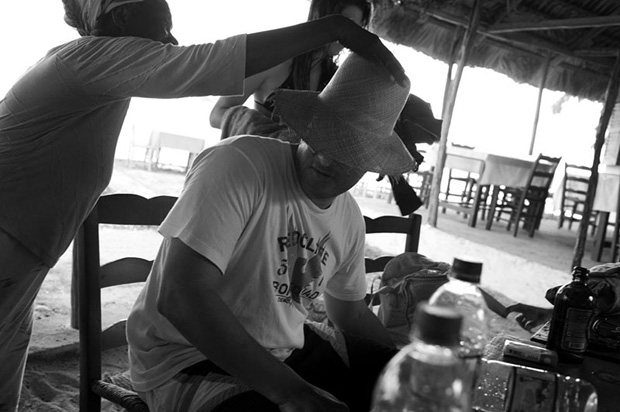 A woman selling handwoven hats to tourists in Jacmel puts the hard sell on Mike.
A woman selling handwoven hats to tourists in Jacmel puts the hard sell on Mike.
“This is a picture of a cop just unloading rounds into the street from inside the station,” Mike had told me a few nights earlier, showing me the photo on his BlackBerry. “You can’t imagine what it’s like to be in that kind of situation.” This was a rare occasion on which he became serious. We were at the bar of the Hotel Oloffson, with an empty bottle of Johnnie Walker Black Label on the table and another on the way. It’s a bar where a lot of wealthy Haitians drink, the bar where Mike told me about the month in 2006 he was almost kidnapped five different times, and about his friend’s wife who was kidnapped in September. This particular night, he could have been talking about the time several years ago wannabe kidnappers sealed off the exits to a club that he had luckily just left. But he was talking about the recent election violence when he said, “Being in a situation like that, there’s no way you want to be there but there’s no way out.” He put his elbows on the table and folded his hands under his chin and lowered his eyes. “You feel totally trapped.”
But that was then. This is beach day! We’ve grabbed water and Gatorade from the gas station and are heading to the sleepier port city of Jacmel, west out of Port-au-Prince and through the catastrophically damaged earthquake epicenter of Leogane, with the Caribbean to our right. Then due south across the peninsula, over the mountains, blasting Billy Idol and Billy Squier as we drive up narrow, climbing switchbacks. We scale 2,500 feet before descending back down to the opposite coast. The trip is 50 miles. It takes two and a half hours to complete it.
“YOU THOUGHT I WAS CRAZY WHEN I SAID sometimes I come all this way for the fish,” Mike says after we’ve settled in at an open-air seaside restaurant. There’s a clean and simple resort next door. There’s a skinny white guy in a sarong actually stroking his soul patch while gazing at the tall turquoise waves crashing onto the shore. Mike’s ordered a whole grilled fish for each of us, as well as two lobsters. The temperature is bordering on hot but not at all uncomfortable. The seafood is cheap but extraordinary.
“This is how we…what is it you call us?” Mike asks.
“Robber barons,” I say. “Not because I think you’re actually screwing anyone, just because that’s people’s impression of white Haitians”—Mike is more light brown, really, but in Haiti that’s close enough—”dropping hundreds of dollars in hotel bars—”
“That’s right, robber barons,” he says, waving my explanation off. “This is how we robber barons live, right?”
I start to qualify again, but he continues to cut me off.
“You know, I work my fucking ass off. I didn’t come from money.” In the 14 years since he emigrated, “I’ve worked behind bars, in gas stations, you name it since I got to this country. Everybody knows I work my ass off, and that’s why they respect me. When I first got here, I opened a car wash—man, I used to get out there in jean shorts and take my shirt off, climbing up on these cars to clean them…They weren’t used to seeing white guys work like that.”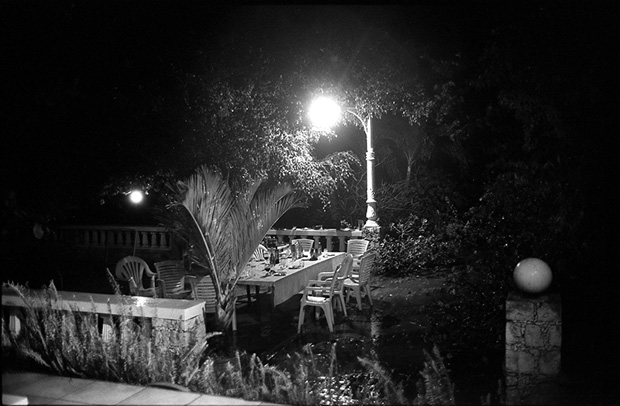 The dinner table is set for family and friends at Joel’s.
The dinner table is set for family and friends at Joel’s.
The successes borne of that work ethic ultimately led him to a partnership with Joel [pronounced jo-ELLE], a fit, tan 46-year-old who joins us on the beach later via a roaring Jet Ski. Joel is the most powerful businessman in Jacmel, and Mike comes here at least twice a month to see him. His dealings are endless: property, potable water, motorcycles, currency exchange—and fuel. “If you live in Jacmel,” as Mike puts it, “and you’ve got 10 gourdes in your pocket, one way or another, two of them belong to Joel.”
“I built all my business from nothing,” Joel, too, explains in a thick accent later that night as we lounge in the infinity pool at his seaside manse. Not because I asked; because he’s venting to Mike that the next generation of Haitians aren’t motivated enough. The inefficiencies of the 10,000 NGOs in the country for aid and rebuilding aren’t helping, he says. “[One of them] gave me a contract to do a job in several weeks. I did it in three days. But they were not happy; they had raised a certain amount of money to do this project, and it cost much less.” He laughs, but shrugs disgustedly. “They never work with me again.”
Joel also highlights the risks of being a big investor in a country that’s so poor and politically unstable (he agrees with Mike that it’s best not to get involved in politics). He mentions, over a patio dinner attended by more house staff than I can keep track of serving whiskey and fried goat’s blood and cake, that to hedge against the possibility of embargo or institutional apocalypse, he keeps ranches stocked with enough cattle to feed him for years. Then I get up to pee and everyone starts yelling “Stop! Stop!” because a Rottweiler named Fallujah and a pack of guard dogs are headed my way for attempting to walk into the house unescorted.
But Joel is far from risk-averse—he and Mike get in a friendly argument about whether it’s reasonable to place $100,000 bets at casinos (Mike thinks watching Joel at a blackjack table will give him a heart attack someday; Joel thinks Mike’s a pussy when it comes to gambling). And anyway, nothing could make him take his cash and talents out of the country of his birth. “This is a beautiful country,” he says on the beautiful hilltop patio. “People don’t realize that. When I tell people I am Haitian, they think I must be a son of a bitch. But I’m proud to be Haitian. I love my country.”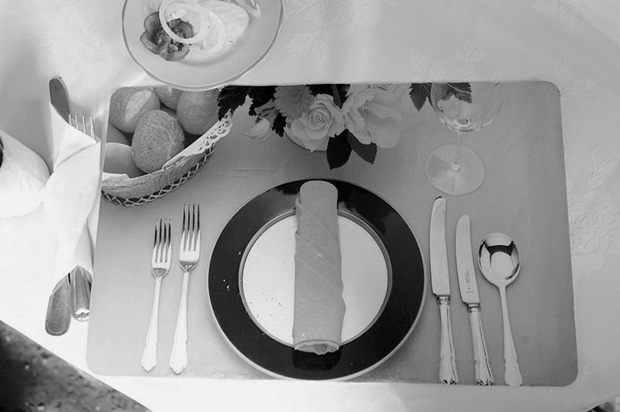 Placemat at the restaurant in Jacmel.
Placemat at the restaurant in Jacmel.
Mike also says that all the time, that he loves it here—though he operates in a decidedly…grittier environment than Jacmel, which may be why he often appends the statement with “I don’t know why.” On the way home, we stop at his Texaco again, and he runs inside. When a rough-looking drunk approaches the truck to talk to me through the open windows and ignores a guard’s demands that he leave, the guard draws his pistol. Mike reemerges from the station, shoulders past them, and gets in the car.
“There’s no point in being negative” is the other thing he says all the time. There’s no point in complaining that you don’t feel safe driving through your work neighborhood at night without moving your gun from inside your car door to directly onto your seat. There’s no sense in abandoning your adopted country and extended family even though you were once shot in the head in a carjacking on your way to the bank. There’s no reason to stop believing that your nation will become more functional, someday, just because you spent this morning constantly checking in with contacts who’d know if further election-related riots were about to break out.
“Things are so bad right now,” Mike said then, “that at this point, they have to fix it. It can’t get any worse, and people are fed up. I think it’s going to get better. I really do. I really think things are gonna get a lot more stable.” He paused, leaned forward with both hands on the wheel, and laughed. “Then again, I said that in 2004 [when Aristide left]. But this time, I think it even more than I did last time.” Election posters for losing Presidential candidate Jude Celestin are still Prevalent throughout Haiti, including on the road to Jacmel.
Election posters for losing Presidential candidate Jude Celestin are still Prevalent throughout Haiti, including on the road to Jacmel.

